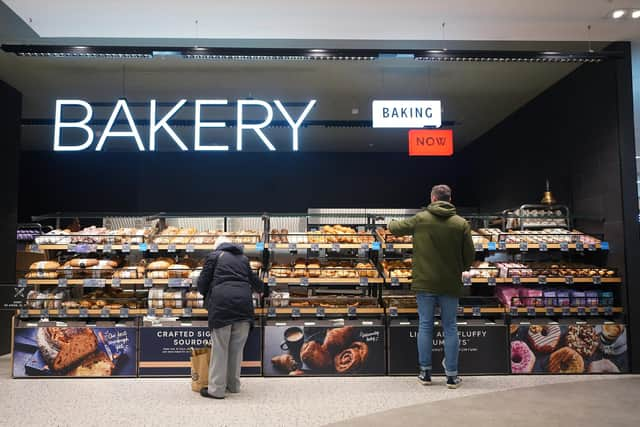Marks & Spencer's 'Remarksable' Christmas: Sales rebound continues but will the M&S sparkle last?
Marks & Spencer has emerged as a festive winner as its turnaround continues and more customers head to its larger stores for their full food shop but there could still be some bumps on the road to full recovery.
The high street stalwart said it had started the new year with a “spring in our step” after sales jumped over Christmas and its food halls saw a record number of shoppers. Like-for-like sales lifted 9.9 per cent across its food arm, while comparable store sales were 4.8 per cent higher in its clothing and home division in the quarter to December 30. While some of the gains were driven by price inflation, M&S said food sales by volume rose around 7 per cent and it increased prices by less than the wider market.
Advertisement
Hide AdAdvertisement
Hide AdThe festive trading update coincided with news that Tesco had enjoyed record sales over the key Christmas period. The UK’s largest retailer said it had cut nearly 2,700 prices in a bid to attract customers who have faced a surge in the cost of living and as it competes with fast-growing German-owned discount rivals Aldi and Lidl.


At M&S, some 9,200 shop workers are set to get bumper payouts under a share scheme thanks to the resilient performance. The employees - mostly customer service assistants - who put a typical £150 a month into the firm’s 2020 share save scheme will gain more than £10,000 when it pays out on February 1.
M&S outperformed the broader market during 2023 with the recent performance of its food division being particularly impressive, despite the cost-of-living spending squeeze. Many consumers have been treating themselves to the odd indulgence or dining at home instead of eating out as often as in the past. A reshaping of its store portfolio, which remains ongoing, has resulted in town and city centre closures, including several in Scotland, but has also seen the opening of larger out-of-town outlets, predominantly focused on food sales.
Shares in M&S ended 2023 at their highest level since early 2019, buoyed by last August’s trading statement update and then November’s equally positive first-half results. The group rejoined the FTSE 100 Index top tier of shares last August after a four-year hiatus thanks to the share gains.
Unveiling the sparkling festive numbers, chief executive Stuart Machin told investors: “We enter 2024 with a spring in our step, but clear eyed on the near-term challenges.” M&S has warned that expectations for economic growth remain “uncertain”, with consumer and geopolitical risks. It also faces additional cost pressures from higher-than-anticipated wage and business rates-related cost inflation.


Zoe Gillespie, investment manager at wealth firm and brokerage RBC Brewin Dolphin, said: “M&S has built on a strong set of results prior to Christmas with a very good festive period. Sales and market share have both increased across its UK offering, while the indications are that new products and approaches are performing well - future results are likely to be in line with expectations.
“The optimism about M&S is, however, tempered slightly by higher-than-anticipated labour costs and business rates, while the economic picture in the UK also looks uncertain. Nevertheless, M&S has been on a very strong run and remains well placed to meet the challenges of the next few months head on.”
Machin said M&S plans to “up the pace” of its overhaul, ramping up its store changes and revamps, “doubling down” on measures to improve its supply chain and availability and to lower costs. It is targeting a 1 per cent increase in market share across both its food and its clothing and home divisions. The firm said it saw strong demand for its “Remarksable” food value ranges over Christmas, with sales up around 18 per cent. Across clothing and homeware, it said store sales rose 2 per cent, while online growth reached 10.9 per cent, noting that it was left with less sale stock - down 6 per cent.
Advertisement
Hide AdAdvertisement
Hide AdAarin Chiekrie, equity analyst at investment platform Hargreaves Lansdown, noted: “In clothing and home, less stock has been making its way to the sale rack, resulting in higher average selling prices and a 4.8 per cent rise in like-for-like sales. The group’s improving style credentials are partly to thank for this, pulling more shoppers through the door over the festive season. As is the group’s reshape programme, which looks to pivot stores to new locations and refresh existing stores to create a more productive estate.”
Richard Hunter, head of markets at Interactive Investor, added: “The company recognises the nearer term challenges arising from geopolitical and consumer risks, while higher than expected business rates and wage inflation could also prove to be something of a drag. Indeed, it is unclear whether the tailwinds of the last several months - favourable market conditions, resilient consumer demand and competitor exits - will be maintained.”
Meanwhile, Tesco said it was on track for bigger-than-expected profits this year after its record sales over the Christmas period. Bosses at the supermarket giant said its growth was boosted by investment to keep prices low, as it has sought to stop shoppers switching to Aldi and Lidl. Like-for-like retail sales across the group rose by 6 per cent over the six weeks to January 6, compared with the same period a year earlier.
John Moore, senior investment manager at RBC Brewin Dolphin, said: “Unlike Morrisons and Asda, Tesco isn’t saddled with debt, and the supermarket has simplified its product range - like Aldi and Lidl - which is filtering through into better working capital dynamics and improved margins.”
Comments
Want to join the conversation? Please or to comment on this article.